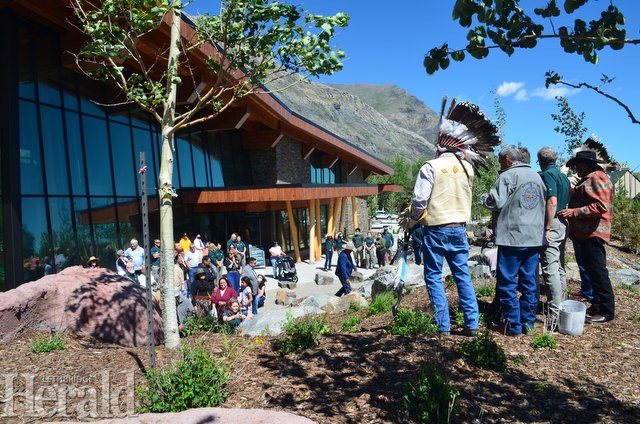Waterton Lakes National Park celebrated the official opening of its new visitor centre Tuesday with a ceremonial planting of white bark pine trees, joined by the Kainai and Piikani Nations. Although the Centre opened back in February, the event served as a ceremonial thank you to those involved in the creation of the facility, including Parks Canada and the Blackfoot Confederacy.
Located on Treaty Seven Territory in the Waterton townsite, the Centre hosts Blackfoot heritage representing the relationship between Waterton Lakes National Park and the Confederacy.
Chief Roy Fox “Makiinima” was in attendance, saying “I really am glad that you have included us in the development of this new initiative. It would be good, if over the years we could have more of our people also work here as well. It continues to prove that the national park, the Waterton park, truly mean what it says when we talk about collaboration.”
Kanai Elder Wilton Goodstriker was also present at the ceremony, speaking of the land and the respect it deserves.
“The Federal Government a few years back, supported the recommendations of the Truth and Reconciliation Committee that mandated all departments get Indigenizing colour into the programs that are adjacent to Indigenous communities.”
Goodstriker spoke of the land’s traditional use as a trade center with other nations, and how Waterton Park works with the community to preserve the sacred land.
“There is a sacred kinship in our belief system of all things. All things are connected, the universe, life, the water. And from that understanding comes our world view. So visitors, we encourage you to appreciate this place. Give thanks that you are at a place that is very sacred.”
Ron Hallman, CEO and president of Parks Canada, spoke of the ongoing collaboration with the Centre to highlight Blackfoot culture and the joint effort in developing its exhibits.
“You are vital partners in conserving national and cultural heritage and preserving these treasured places like Waterton Lakes National Park for generations to come. We learn from you; we aspire to incorporate many of the ways you’ve shared with us on protecting nature. And you honour us with your presence here today.”
Hallman says the Centre would not have happened without the effort of the Indigenous community, and hopes it will be a central hub in Waterton Village.
“A place for participants to meet, to learn and to share their experiences about the natural and cultural history that we have all come to love and experience, all while taking in this spectacular part of southern Alberta.”
Locke Marshall, Superintendent of Waterton Lakes, says the Centre is a great opportunity to incorporate Blackfoot culture into the park and is hoping to share with visitors the rich culture as well as the natural heritage protected in Waterton Lakes.
“We’re going to continue to work with our Indigenous partners, this has been a really good start. […] We have other projects in the park that already involve our Indigenous neighbours, and we’re going to continue in that realm. This has been a really good way to get started, and it’s a good representation of the kind of relationship that’s building within those communities.”



